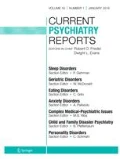Abstract
Although antidepressants represent the cornerstone of medical management of major depressive disorder, several widely publicized recent developments have called into question the safety and effectiveness of the antidepressant medications. This article reviews the methods used to conduct studies of antidepressant efficacy, with particular focus on the research conducted by the pharmaceutical industry. It is concluded that the specific efficacy of antidepressant medications in contemporary, industry-sponsored, randomized, controlled trials is modest compared with that of medications in double-blind, placebo trials. Sources of bias and artifact that detract from these studies’ validity and limit their interpretability are reviewed. It is also argued that these studies—which are primarily conducted to obtain regulatory approval, to introduce new medications, or to showcase particular advantages of newer drugs after regulatory approval—form an inadequate basis for an evidence-based medicine assessment of antidepressant effectiveness.
Similar content being viewed by others
References and Recommended Reading
Leon AC: The revised warning for antidepressants and suicidality: unveiling the black box of statistical analyses. Am J Psychiatry 2007, 164:1786–1789.
Turner EH, Matthews AM, Linardatos E, et al.: Selective publication of antidepressant trials and its influence on apparent efficacy. N Engl J Med 2008, 358:252–260.
Kirsch I, Deacon BJ, Huedo-Medina TB, et al.: Initial severity and antidepressant benefits: a meta-analysis of data submitted to the Food and Drug Administration. PLoS Med 2008, 5:e45.
Rosenthal R: Meta-analysis: a review. Psychosom Med 1991, 53:247–271.
Thase ME: Comparing the methods used to compare antidepressants. Psychopharmacol Bull 2002, 36(Suppl 1):1–17.
Lieberman JA, Greenhouse J, Hamer RM, et al.: Comparing the effects of antidepressants: consensus guidelines for evaluating quantitative review of antidepressant efficacy. Neuropsychopharmacology 2005, 30:445–460.
Depression Guideline Panel: Clinical Practice Guideline Number 5. Depression in Primary Care, Volume 2: Treatment of Major Depression 93-0551. Rockville, MD: Department of Health and Human Services Agency for Health Care Policy and Research; 1993.
Practice guideline for major depressive disorder in adults. American Psychiatric Association. Am J Psychiatry 1993, 150(4 Suppl):1–26.
Walsh BT, Seidman SN, Sysko R, Gould M: Placebo response in studies of major depression. Variable, substantial, and growing. JAMA 2002, 287:1840–1847.
Zimmerman M, Chelminski I, Posternak MA: Generalizability of antidepressant efficacy trials: differences between depressed psychiatric outpatients who would or would not qualify for an efficacy trial. Am J Psychiatry 2005, 162:1370–1372.
Rothman KJ, Michels KB: Sounding board. The continuing unethical use of placebo controls. N Engl J Med 1994, 331:394–398.
Charney DS, Nemeroff CB, Lewis L, et al.: National Depressive and Manic-Depressive Association consensus statement on the use of placebo in clinical trials of mood disorders. Arch Gen Psychiatry 2002, 59:262–270.
Schatzberg AF, Kraemer HC: Use of placebo control groups in evaluating efficacy of treatment of unipolar major depression. Biol Psychiatry 2000, 47:736–744.
Leon AC, Solomon DA: Toward rapproachment in the placebo control debate. A calculated compromise of power. Eval Health Prof 2003, 26:404–414.
Khan A, Warner HA, Brown WA: Symptom reduction and suicide risk in patients treated with placebo in antidepressant clinical trials. An analysis of the Food and Drug Administration database. Arch Gen Psychiatry 2000, 57:311–317.
Thase ME, Pritchett YL, Ossanna MJ, et al.: Efficacy of duloxetine and selective serotonin reuptake inhibitors: comparators as assessed by remission rates in patients with major depressive disorder. J Clin Psychopharmacol 2007, 27:672–676.
Freemantle N, Anderson IM, Young P: Predictive value of pharmacological activity for the relative efficacy of antidepressant drugs. Meta-regression analysis. Br J Psychiatry 2000, 177:292–302.
Cohen J: Statistical Power Analysis for the Behavioral Sciences. New York: Academic Press; 1977.
Kraemer HC, Kupfer DJ: Size of treatment effects and their importance to clinical research and practice. Biol Psychiatry 2006, 59:990–996.
Cipriani A, Barbui C, Brambilla P, et al.: Are all antidepressants really the same? The case of fluoxetine: a systematic review. J Clin Psychiatry 2006, 67:850–864.
Perkins DO, Wyatt RJ, Bartko JJ: Penny-wise and poundfoolish: the impact of measurement error on sample size requirements in clinical trials. Biol Psychiatry 2000, 47:762–766.
Müller MJ, Szegedi A: Effects of interrater reliability of psychopathologic assessment on power and sample size calculations in clinical trials. J Clin Psychopharmacol 2002, 22:318–325.
Klein DF: Flawed meta-analyses comparing psychotherapy with pharmacotherapy. Am J Psychiatry 2000, 157:1204–1211.
Author information
Authors and Affiliations
Corresponding author
Rights and permissions
About this article
Cite this article
Thase, M.E. Do antidepressants really work? A clinicians’ guide to evaluating the evidence. Curr Psychiatry Rep 10, 487–494 (2008). https://doi.org/10.1007/s11920-008-0078-2
Published:
Issue Date:
DOI: https://doi.org/10.1007/s11920-008-0078-2


